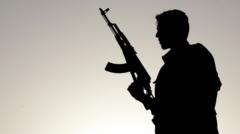In a historic turn, the Kurdish PKK has commenced disarmament, marking a hopeful step for peace after 40 years of violence.
**Kurdish PKK Initiates Disarmament Procedure as Turkey Seeks Peace**

**Kurdish PKK Initiates Disarmament Procedure as Turkey Seeks Peace**
A ceremonial gun-burning by Kurdish PKK fighters signals a potential end to decades of conflict in Turkey.
The outlawed Kurdish PKK has delivered a monumental gesture in its long-standing conflict with Turkey by holding a gun-burning ceremony, signaling the initiation of a disarmament process. Approximately 30 fighters, both men and women, took part in this symbolic event, where their weapons were ceremonially placed in a cauldron and ignited, representing a pivotal step towards peace after four decades of armed struggle that has claimed around 40,000 lives. The Turkish government has recognized this act as a significant milestone in its objective of establishing a "terror-free Turkey."
The ceremony took place in the scenic Jasana cave in Iraqi Kurdistan, where members of the pro-Kurdish opposition party and journalists were invited to witness the moment. The PKK issued a statement proclaiming the weapon destruction as a demonstration of their goodwill and commitment to peace. This event follows a pivotal message from the PKK's imprisoned leader, Abdullah Ocalan, who emphasized the group's voluntary transition from armed conflict to democratic dialogue.
The disarmament is anticipated to unfold throughout the summer, coordinated with the involvement of Turkish, Iraqi, and regional governments. Efforts at peace between Turkey and the PKK aren't new, but the current situation has emerged as an optimistic point in a historically turbulent relationship. The PKK began as a Marxist group advocating for Kurdish independence, transitioning in the 1990s to seek enhanced autonomy for Kurds, who represent about 20% of Turkey's population.
Ocalan, who has been confined since 1999, recently encouraged the PKK to dissolve during a historic appeal relayed by pro-Kurdish Democrat Party MPs. His authority remains influential among many Kurds, with a significant call-to-action urging for peaceful resolutions instead of violence.
As the next steps await the sessions within Turkey's parliament for deliberation on further measures — potentially leading to Ocalan’s release depending on the evolving circumstances — the focus shifts to the legislative decisions ahead. This effort for peace appears to intersect with Turkish politics, potentially allowing President Erdogan to secure continued influence and support from the pro-Kurdish party amid challenges he faces in upcoming elections. The significance of this disarmament process transcends national borders, carrying implications for regional stability in Iraq, Syria, and Iran.
The ceremony took place in the scenic Jasana cave in Iraqi Kurdistan, where members of the pro-Kurdish opposition party and journalists were invited to witness the moment. The PKK issued a statement proclaiming the weapon destruction as a demonstration of their goodwill and commitment to peace. This event follows a pivotal message from the PKK's imprisoned leader, Abdullah Ocalan, who emphasized the group's voluntary transition from armed conflict to democratic dialogue.
The disarmament is anticipated to unfold throughout the summer, coordinated with the involvement of Turkish, Iraqi, and regional governments. Efforts at peace between Turkey and the PKK aren't new, but the current situation has emerged as an optimistic point in a historically turbulent relationship. The PKK began as a Marxist group advocating for Kurdish independence, transitioning in the 1990s to seek enhanced autonomy for Kurds, who represent about 20% of Turkey's population.
Ocalan, who has been confined since 1999, recently encouraged the PKK to dissolve during a historic appeal relayed by pro-Kurdish Democrat Party MPs. His authority remains influential among many Kurds, with a significant call-to-action urging for peaceful resolutions instead of violence.
As the next steps await the sessions within Turkey's parliament for deliberation on further measures — potentially leading to Ocalan’s release depending on the evolving circumstances — the focus shifts to the legislative decisions ahead. This effort for peace appears to intersect with Turkish politics, potentially allowing President Erdogan to secure continued influence and support from the pro-Kurdish party amid challenges he faces in upcoming elections. The significance of this disarmament process transcends national borders, carrying implications for regional stability in Iraq, Syria, and Iran.



















